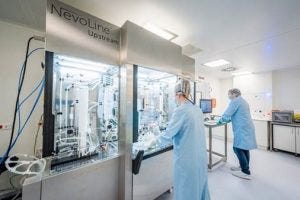The partnership will see IDT Biologika and Exothera collaborate to develop a large-scale manufacturing process for viral vector-based vaccines.
According to both contract development manufacturing organizations (CDMOs), the study will focus on Modified Vaccinia Ankara (MVA) as a first example for IDT’s wide range of vector technologies.
“The MVA is a viral vector that has been successfully validated with a long history of use in clinical trials. MVA expressing recombinant antigens is a flexible vaccine tool that has been shown to be safe and immunogenic in many human subjects in various clinical studies (Förster et al., 2020),” Romain De Rauville, vice president of business development at Exothera told BioProcess Insider.

Exothera’s development technician operating the NevoLine Upstream platform. Image c/o Exothera
Exothera (launched by Univercells Technologies in March 2020) has transferred IDT’s upstream process from small to large scale using the NevoLine Upstream platform.
The NevoLine Upstream platform is described as a biomanufacturing technology “that delivers cost-effective viral production, including vaccines, gene therapies and oncolytic viruses.” Its commercial and clinical scale “upstream production is achieved within a 3m² footprint.”
According to both firms, the collaboration will demonstrate the application and improved performance of the NevoLine platform at full commercial capacity.
“For both viral vaccines and gene therapy, we need to benefit from innovative production platforms that allow for optimized production, i.e., a greater number of doses more quickly and at a lower price,” said Rauville.
“This collaboration is leveraging from Exothera’s technological know-how to accelerate the industrialization of innovative vaccine.”
The platform is already operational at Exothera’s site in Belgium, and it has three NevoLines, one is used for R&D and the other two for manufacturing for mass production of doses.







